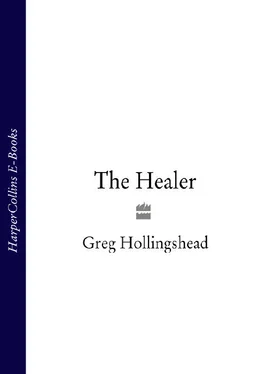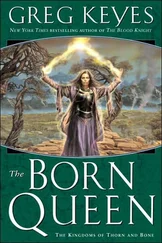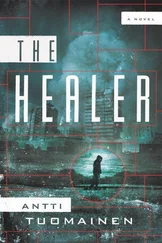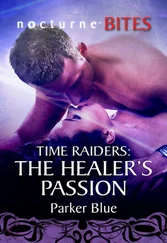The Grant Fairgrounds were five minutes north and east of the town, on a tabletop cuesta that towered like Eden above the working fields. As the lane wound upward, the plume of red dust in the rearview swelled and rose and moved out through the planted pines. Wakelin slowed at a rusted gate, standing open. The peeling white fences of the grounds were swamped in their decay by milkweed and field grass. It was evident that this year’s Grant Fair would not be some weekend soon. Now on Wakelin’s right was a long, low sag-roofed building, like stables. At the chained doors of a larger, more barnlike structure, he turned left and drove down into the thistle-and-dirt bed of a racetrack and up out of it, crossed a patchy barren of dandelion and gravel, and descended into the track bed on the far side of the oval. A hundred metres down the stretch to his right, he saw weather-blackened white bleachers. Immediately ahead, a graffitied exhibition hall in cream-yellow slate, where a shining red tow truck stood majestic amidst a few battered pickups.
From inside the exhibition hall, the sound of hammering. Wakelin left his car alongside one of the lesser vehicles and passed through great standing wooden doors into the echoing space. The building had a mansard roof and gables, and the green light came tilting down in long shafts from the ancient mossy windows. At the far end, in a haze of dust, two kneeling carpenters were hammering away at what looked like the raw skeleton of a low platform. Two other men stood nearby, their figures large in the particulate blur. As Wakelin came up to them, the shorter, stockier man glanced at him past the other’s shoulder. He was First Nations, wearing workboots and soiled coveralls unzipped to the navel. To Wakelin’s eye there was no hair on his head or body whatsoever. Not eyebrows, not belly hair. His head and face and chest had a pinguid smoothness, the skin like a latex bodysuit from which the trapped and lashless eyes gazed sadly forth.
Bachelor Crooked Hand, Wakelin thought. It’s got to be.
When one of the carpenters looked over at Wakelin, the other, taller man, the one speaking, turned to see who or what had caught the carpenter’s attention. But only briefly, too briefly for Wakelin to see his eyes, which required the merest glance to discover the utter lack of significance of this arrival. And so Wakelin found himself standing waiting for the man to finish telling a story, a rural incident, in which a child’s head had been sawed off in front of its mother, except that the sawer had got either the wrong child or the wrong mother, and this would be the lawyer’s plea: diminished guilt by reason of mistaken identity. Not so much grief caused as otherwise, your Honour.
Lawyers, fuck ‘em, Wakelin thought. And then he wondered what the teller was pretending to think: that a stranger would show up in an empty exhibition hall in out-of-season fairgrounds where nameless construction was under way and just stand around being pointedly ignored while eavesdropping on a leisurely recounting of some grisly local horror? And then he saw a look pass between the two carpenters and one of them glanced over, and that did it. He stepped forward.
“Excuse me,” he said.
The man stopped talking. The native considered Wakelin once more.
“I’m looking for Ross Troyer,” Wakelin said.
Now the other turned to face him. He was taller and older and better dressed than either his companion or Wakelin. He wore a collarless stitch-striped blue shirt with dress jeans and loafers. His face was handsome like a child’s, large and mild, and he wore his hair long and combed back in waves, like a movie star’s, except that there was something terrible about his eyes. It was as if they had been lobbed in on a dare from a distance of several feet, or as if it just happened to be human sockets they had landed in, it could as easily have been a wolf’s. The irises were milk-green, paler than the circle of the sun-beat face and paler still at their inside than their outside rims, a circumstance causing an impression of concavity, which in turn caused the pupils to appear to protrude, like rods. Rods that swelled and contracted, swelled and contracted, until they had got Wakelin just right. Then they stopped moving.
The man said nothing at all, just drilled Wakelin, just skewered him.
“Are you Ross Troyer?” Wakelin said.
In reply, heavy lids lowered slowly over the terrible eyes. Lifted once more.
“I’m Ross Troyer,” the other, hairless man said.
“Oh, really?” Wakelin cried and turned, so surprised he behaved like someone startled. “I thought you were—” Holding out his hand.
The hairless man’s hands remained in the pockets of his coveralls. He just looked at Wakelin. Face of iron, acid-pocked iron.
“What do you want?” the first man said, any impatience he might have felt at his companion’s little trick directed clean at Wakelin.
Turning back to him, Wakelin said stupidly, “You’re Ross Troyer?” and then, “I’m looking for some country property. Something—”
“You talked to her?” Troyer said quickly, a glance at his friend.
“Yes, I—”
“What’d she say?”
“She told me to talk to you.”
Troyer nodded. He seemed to wait.
And so Wakelin talked to him. He said what he had planned to say, the same thing he had said with fanatic earnestness to every realtor he had spoken to when he was up in this area last summer, in his hot hand the money Jane had left him, when he truly was looking for a place in the country. Or thought he was. Three months off and on, spring to fall, he had searched. Nothing. Until one airless September night in a cricketing motel room, not so far from here actually, he had leaned into the half-unsilvered mirror above the cigarette-burn scalloped dresser top and asked himself what exactly he thought he was going to do in the country. Get in touch with his grief? Commune with the chipmunks? Hang himself from a tall oak tree? When no answer came from the glass, he drove back to the city where he would rid his mind of all thought of sylvan redemption. Or try to.
The word Wakelin had used most often in his statement to realtors last summer when describing what he was looking for in a piece of property was silence. He used this word again now in his statement to Ross Troyer. Silence. Country silence. No neighbours, no traffic. No highway over the next hill. He told Ross Troyer that he had been searching for silence since early spring. He asked him if he realized how hard it is to find silence in the city. He told him how in his search for silence he had crossed and recrossed half the southern Shield, that he was serious, that he could pay cash. He told him exactly how much he could afford to pay (though he could afford a little more than what he said, because he still had the money from Jane). He did not tell Ross Troyer (and did not know himself) if he was talking about silence because silence was still, or ever had been, of genuine value to him, or because last summer he had talked about it so often that he was starting to believe in it himself, or because in the pressure of the moment he was mouthing bits of last summer’s speeches, and really this was nothing but words. Repeats, at that. Old words. He didn’t believe in silence and never had. And he did not tell Ross Troyer that the sole reason he was here—conscious reason—was to find a way to talk to his daughter in order to get enough new material on her healing activities, or on her having given them up, so that he could go back to the city and write the story and so move on to the next and after that the next, and all this talk about silence was really just a symptom of a private fantasy of respite from the mechanical round of the life of a man who had lost its compass when he lost his wife.
Читать дальше











